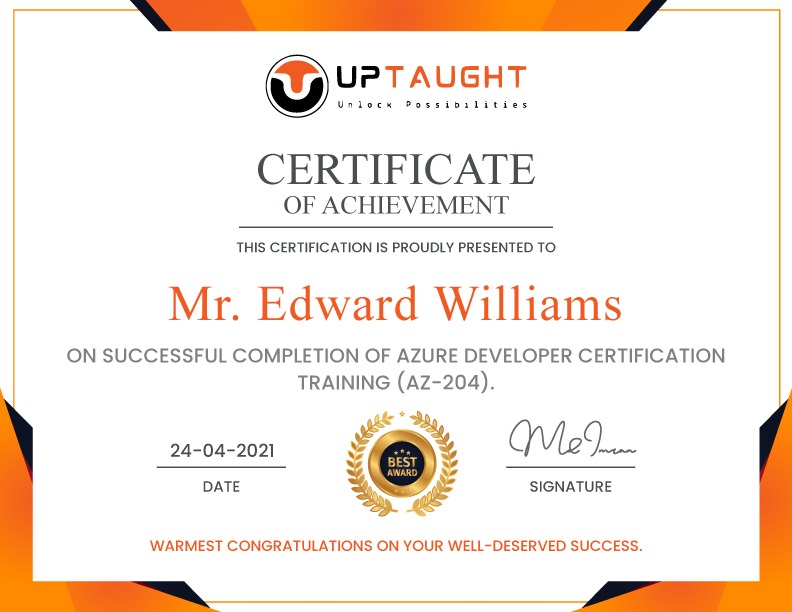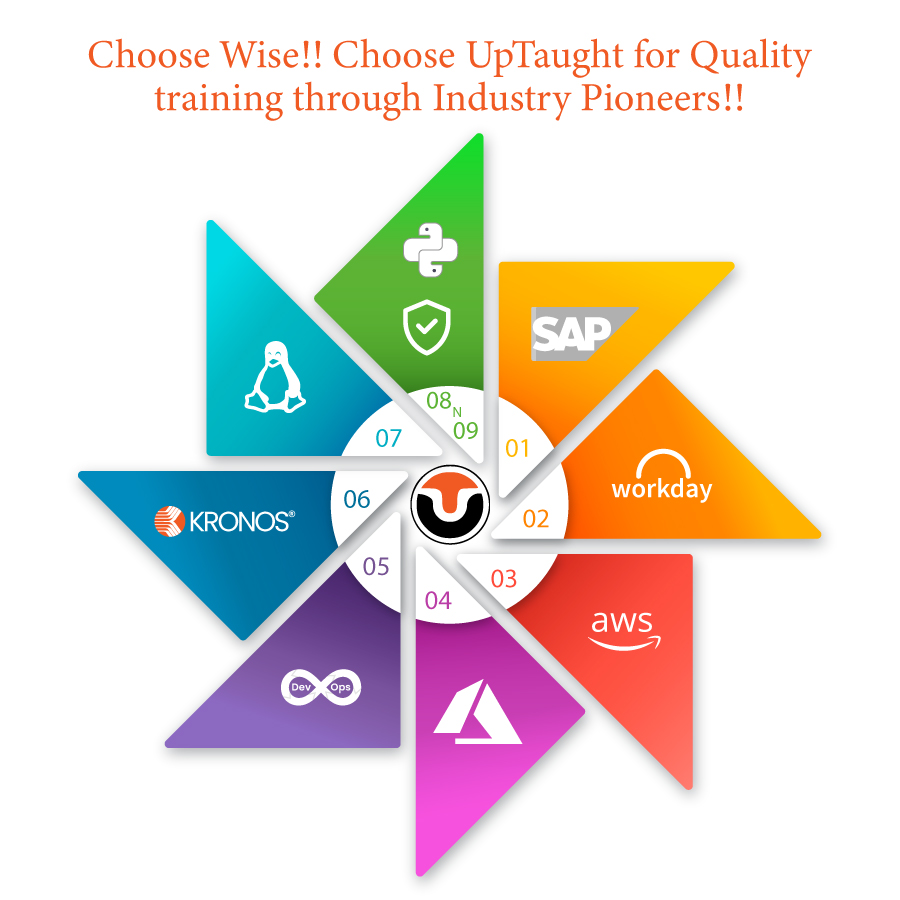Azure Developer Certification Training (AZ-204)
You can now become a proficient Developer and build about 30+ different websites and web apps using different coding languages with UpTaught’s Azure Developer Certification training aligns with the latest (2020) edition of Azure Developer Certified Associate exam AZ-204. Become a potential developers with latest updated course content and build a social foundation among the profound competitors with 200+ hours of live interactive webinars, self paced course videos, assignments and lab sessions with 20+ real hands-on project from industries leading companies.
Prepare yourself and tighten up your skills with us. Enroll Today!
-
LevelAll Levels
Start Date
Time
Duration
Type
Mode of Training
Course Curriculum
Module 1 – Introduction to Azure IaaS Compute Solutions
-
1. Overview of Microsoft Azure
-
2. Azure Virtual Machines
-
3. Setup Azure VMs for remote access
-
4. Using Azure SDKs
Module 2 – Implementing Azure Batch Service and Disk Encryption
-
1. ARM templates for Azure Virtual Machines
-
2. Azure Disk Encryption
-
3. Azure Batch Services
Module 3 – Planning and Developing Applications that utilize Containers
-
1. Overview of Azure Kubernetes Service (AKS)
-
2. AKS clusters
-
3. Azure Container Registry
Module 4 – Executing Azure App Service Web Apps & Mobile Apps
-
1. Azure App Service core concepts
-
2. Azure App Service Web Apps
-
3. WebJobs
-
4. Azure App Service Mobile Apps
-
5. Registering apps for Push notification
Module 5 – Generating Azure App Service Web Apps
-
1. Azure App Service core concepts
-
2. Establishing an Azure App Service Web App
-
3. Setting up and Monitoring App Service apps
-
4. Scaling App Service apps
-
5. Azure App Service staging environments
Module 6 – Execute Azure functions
-
1. Azure Functions overview
-
2. Developing Azure Functions
-
3. Implement Durable Functions
Module 7 – Develop solutions that utilize blob storage
-
1. Azure Blob storage core concepts
-
2. Regulating the Azure Blob storage lifecycle
-
3. Performing with Azure Blob storage
-
4. Blob Leasing in Azure
-
5. Hot Storage
-
6. Cool Storage
-
7. Archive Storage
Module 8 – Develop solutions that use Cosmos DB storage
-
1. Azure Cosmos DB overview
-
2. Azure Cosmos DB data structure
-
3. Performing with Azure Cosmos DB resources and data
-
4. Azure Table storage overview
-
5. Authorization in Table storage
-
6. Table service REST API
-
7. Managing containers and items
-
8. Handle documents
-
9. Scaling
-
10. Execute server-side programming
Module 9 – Implement IaaS solutions
-
1. Provisioning VMs in Azure
-
2. Generate and deploy ARM templates
-
3. Generate container images for solutions
-
4. Publish a container image to Azure Container Registry
-
5. Generate and operate container images in Azure Container Instances
Module 10 – Execute user authentication and authorization
-
1. Microsoft Identity Platform v2.0
-
2. Authentication using the Microsoft Authentication Library
-
3. Using Microsoft Graph
-
4. Authorizing data operations in Azure Storage
-
5. OAuth2 authentication
-
6. Managed Identities
-
7. Azure Key Vault
-
8. Claims-based authorization
-
9. Role-based access control (RBAC) authorizaon
Module 11 – Execute secure cloud solutions
-
1. Regulate keys, secrets, and certificates by using the KeyVault API
-
2. Execute Managed Identities for Azure resources
-
3. Secure app configuration data by utilizing Azure App Configuration
Module 12 – Execute API Management
-
1. API Management overview
-
2. Defining policies for APIs
-
3. Securing your APIs
Module 13 – Develop App Service Logic Apps
-
1. Azure Logic Apps overview
-
2. Generating custom connectors for Logic Apps
-
3. Custom templates for Logic Apps
-
4. Azure Search service
-
5. Introduction to the API Management service
-
6. Secure APIs
-
7. Define API policies
Module 14 – Develop event-based solutions
-
1. Execute solutions that use Azure Event Grid
-
2. Execute solutions that use Azure Event Hubs
-
3. Execute solutions that use Azure Notification Hubs
Module 15 – Develop message-based solutions
-
1. Execute solutions that utilize Azure Service Bus
-
2. Execute soluons that ulize Azure Queue Storage queues
Module 16 – Monitor and optimize Azure solutions
-
1. Overview of monitoring in Azure
-
2. Instrument an app for monitoring
-
3. Application Insights
-
4. Autoscale patterns and best practices
-
5. Evaluate and troubleshooting apps
-
6. Execute code that handles transient faults
Module 17 – Integrate caching and content delivery within solutions
-
1. Develop for Azure Cache for Redis
-
2. Develop for storage on CDNs
Azure Developer Certification Training (AZ-204)
-
LevelAll Levels

Roadmap
Salary range
FAQs
AZ-204 is an associate-level exam that has ‘Intermediate’ difficulty when compared to other Microsoft role-based exams.
This exam measures your ability to accomplish the following technical tasks: develop Azure compute solutions; develop for Azure storage; implement Azure security; monitor, troubleshoot, and optimize Azure solutions; and connect to and consume Azure services and third-party services.
If you have completed AZ-204, you can complete the AZ-400 to get the Azure DevOps Expert certification, which tests your end-to-end cloud knowledge.
It depends on your experience and skills. If you are a beginner, it takes about 3-4 months and if you are intermediate then it may take you 2-3 months.
The average salary for Azure skills is $96,000 as per compensation data firm PayScale.
Here are some of the jobs you could expect to get after passing the Azure DevOps certification exam.
- Junior Azure Architect
- Cloud Architect/Cloud Engineer
- Senior Cloud and DevOps Architect
The certification exam costs $165 USD.
Microsoft is the second-biggest cloud provider in the market. It was launched in 2012 and has been emerging at an unprecedented rate since then. According to a study by Forbes, Microsoft Azure revenue developed 50% year-over-year in fiscal Q2, 2021. Cloud technology has taken the IT world by storm. More than 70% of the IT companies utilize the Cloud in one form or another, and this is going to enhance in the upcoming years. Hence, there is going to be a crucial shortage for Cloud professionals in the coming years. So gear up, and be ready!
You are allowed to take Azure cloud certification exam only for 5 times in a year. After exceeding the limit of 5 attempts, you can retake only after the completion of 12 months from the date of exhaustion of 5th attempt.
Microsoft certifications are structured into four levels:
- Fundamentals
- Associate
- Expert
- Specialty
If you want to ace Azure Certification and to developing applications in Azure, you require knowledge of:
- Open-source frameworks like ASP.NET
- Programming languages like SQL Server, HTML5 and JavaScript
Other skills comprises the understanding of how core services like networking, databases, servers, and software perform in the cloud. If you have prior working experience with another cloud platform like AWS or Google Cloud, it will give you skills that transition to Azure.
Also, you must possess knowledge of handling Microsoft tools like Office 365 and PowerShell that will assists you comprehend how these services integrate with Azure.
The average azure DevOps engineer salary in the USA is $167,807 per year.
Major companies that are hiring Azure Developer certified professionals are:
- Microsoft
- IBM
- Walmart
- TCS
- KPMG
The following are the responsibilities of a Cloud Architect:
- Establishing best practices for cloud practice within an organization
- Discussing real business problems and finding opportunities with cloud technologies
- Overseeing governance, AKA the rules and standards the cloud environment must stand by.
- IT security task to control privacy and develop incident response procedures.
- Plans to reduce any risks that security and governance might have helped identify.
- Evaluating cloud infrastructure costs and meeting budgets.
- And of course, Plan and implement their cloud infrastructure.





